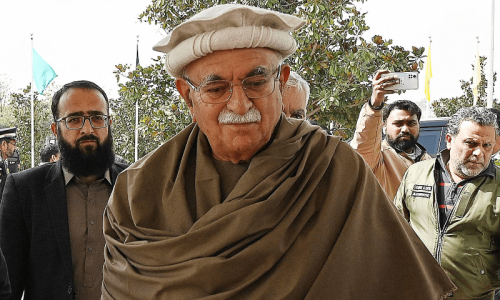There have been many attempts before and, likely, the road ahead will be arduous, but Pakistan and Afghanistan must engage and continue to seek cooperative solutions.
Sensibly, the Pakistani political and military leadership appears to acknowledge the common threat of terrorism that the two countries face and has, in the wake of the recent terror wave here, redoubled its efforts to seek the Afghan government’s assistance.
The disclosure by foreign affairs adviser Sartaj Aziz that a joint mechanism may be announced soon to address the concerns that Pakistan and Afghanistan have regarding militant sanctuaries and cross-border terrorism is a welcome attempt to move past debilitating blame games and focus on a problem that could have significant regional peace dividends.
Complex as the challenges are, there are at least two things that need to be reiterated. First, for all of the Afghan government’s long-standing concerns, some of which are undeniably legitimate, the perception that Afghanistan has become willing to inflict punishment on Pakistan in order to elicit a change in policy has become a dangerously destabilising factor. Moreover, it is self-defeating.
The banned TTP and allied Pakistani militants who have found sanctuary in eastern Afghanistan are a threat to that country too. Unlike the Afghan Taliban, who have consistently clung to a nationalist agenda, the TTP and IS are fundamentally wedded to a pan-Islamist worldview. Their agenda, especially that of IS, does not stop at destabilising Pakistan but extends to conquering Afghanistan too.
Wrongheaded as some of the strategic choices by this country have been, Kabul’s trying to build pressure on Pakistan by allowing anti-Pakistan militancy to proliferate on Afghan soil will not only destroy bilateral ties but also engulf Afghanistan. The Afghan state’s frustration with Pakistan should not put the two countries on a path towards collective strategic suicide.
For Pakistan, the need is to not succumb to knee-jerk reactions that damage the relationship with the Afghan people. Targeting Afghan nationals in counterterrorism sweeps; closing border crossings used by peaceful Afghans; attempting to evict Afghan refugees with decades-old ties to this country — Pakistani authorities must not take steps that further alienate the Afghan people.
There has been little to no evidence shared with the public so far that the hubs of Afghan populations in Pakistani cities and towns are hubs of terrorism. Indeed, most Afghan communities house a hardworking population that contributes to the economy and helps sustain the historically close ties with Afghanistan.
Terrorism, it should be obvious, thrives in environments of fear and repression. Pakistan must defend itself and has a right to determine its strategic priorities. But those priorities must be rooted in an understanding of national security that is sensible, humane and of benefit to the region.
Published in Dawn, February 27th, 2017















































